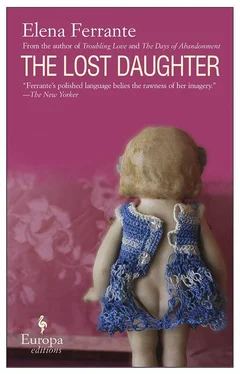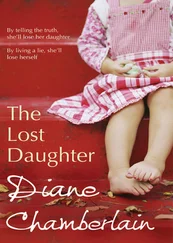Around noon something new happened. I was napping in the shade, even though the music that came from the bath house was too loud, when I heard the pregnant woman calling Nina, as if she had something extraordinary to announce.
I opened my eyes, noticed the girl pick up her daughter, and point out to her something or someone behind me with exaggerated cheerfulness. I turned and saw a heavy, thickset man, between thirty and forty, who was coming down the wooden walkway, his head completely shaved, wearing a tight-fitting black T-shirt that held in a substantial belly above green bathing trunks. The child recognized him, made signs of greeting, but nervously, laughing and coyly hiding her face between her mother’s neck and shoulder. The man, with a serious expression, gave a faint wave. His face was handsome, his eyes sharp. In no hurry, he stopped to greet the manager, gave an affectionate pat to the young attendant, who had immediately come over, and at the same time an entourage of large jovial men in bathing suits also stopped, one with a backpack, one with a cooler, one with two or three packages, which, to judge from the ribbons and bows, must be gifts. When the man finally reached the beach, Nina came up to him carrying the child, again stopping the little procession. He, still serious, with composed gestures, first of all took Elena from her embrace; the child hugged him, arms around his neck, giving his cheeks small anxious kisses. Then, still offering his cheek to her, he seized Nina behind the neck, almost forcing her to bend over—he was at least four inches shorter than she was—and fleetingly touched her lips, with restrained, proprietary command.
I guessed that Elena’s father had arrived, Nina’s husband. Among the Neapolitans a kind of party started up immediately, and they crowded around, right up to the edge of my umbrella. I saw that the child was unwrapping presents, that Nina was trying on an ugly straw hat. Then the new arrival pointed to something on the sea, a white motorboat. The old man with the mean look, the boys, the fat gray-haired woman, the girl and boy cousins gathered along the shore, shouting and waving their arms in signs of greeting. The motorboat passed the line of red buoys, zigzagged among the swimmers, crossed the line of white buoys, and arrived, its motor still running, amid children and old people swimming in the shallow water. Heavy men with worn faces, ostentatiously wealthy women, obese children jumped out. Embraces, kisses on the cheek, Nina’s hat carried it off by the wind. Her husband, like a motionless animal that at the first sign of danger springs with unexpected force and decisiveness, grabbed it in midair, despite the child in his arms, before it ended up in the water, and gave it back to her. She put it on more carefully; suddenly the hat seemed pretty, and I felt an irrational pang of unease.
The confusion grew. The new arrivals were evidently disappointed by the arrangement of the umbrellas; the husband called Gino over, and the manager came, too. I got the impression that they all wanted to be together, the resident family group and those who were visiting, forming a compact wedge of loungers and chairs and coolers, of children and adults having a good time. They pointed in my direction, where there were two free umbrellas, with a lot of gestures, especially the pregnant woman, who eventually began asking her neighbors to move, to shift from one umbrella to another, just as at the movies someone asks if you would please move over a few seats.
A game-like atmosphere was created. The bathers hesitated, they didn’t want to move, with all their belongings, but both the children and the adults of the Neapolitan family were already cheerfully packing up, and finally most of the bathers moved almost willingly.
I opened a book, but by now I had a knot of bitter feelings inside that at every impact of sound, color, odor grew even more bitter. Those people annoyed me. I had been born in a not dissimilar environment, my uncles, my cousins, my father were like that, of a domineering cordiality. They were ceremonious, usually very sociable; every question sounded on their lips like an order barely disguised by a false good humor, and if necessary they could be vulgarly insulting and violent. My mother was ashamed of the rude nature of my father and his relatives, she wanted to be different; within that world, she played at being the well-dressed, well-behaved lady, but at the first sign of conflict the mask cracked, and she, too, clung to the actions, the language of the others, with a violence that was no different. I observed her, amazed and disappointed, and determined not to be like her, to become truly different and so show her that it was useless and cruel to frighten us with her repeated “You will never ever ever see me again”; instead she should have changed for real, or left home for real, left us, disappeared. How I suffered for her and for myself, how ashamed I was to have come out of the belly of such an unhappy person. That thought, now, amid the confusion on the beach, made me more anxious and my disdain for the habits of those people grew, along with a thread of anguish.
Meanwhile the moving process had hit a snag. There was a small family to whom the pregnant woman couldn’t manage to explain herself, another language, foreigners, they wanted to stay under their umbrella. The children tried to convince them, the dark cousins, the fierce old man: nothing. Then I realized that they were talking to Gino, they were looking in my direction. He and the pregnant woman came toward me like a delegation.
The young man, embarrassed, pointed out to me the foreigners—father, mother, two small boys. Germans, he called them, and asked if I knew the language, if I would act as interpreter, and the woman, holding one hand behind her back and thrusting her naked belly forward, added in dialect that with those people you couldn’t understand anything, I was to tell them that it was just a matter of changing umbrellas, no more, to enable the Neapolitans to stay together, friends and relatives, they were having a party.
I gave Gino a cold nod of assent and went to talk to the Germans, who turned out to be Dutch. I felt Nina’s eyes on me, and spoke in a loud, confident voice. With my first words, I felt, I don’t know why, a desire to show off my skills, and I conversed with enthusiasm. The head of the family was persuaded, the air of friendliness returned, Dutch and Neapolitans mingled. When I returned to my umbrella, I walked by Nina on purpose and for the first time saw her from close up. She seemed to me less beautiful, not as young, the waxing at her groin had been done badly, the child she held in her arms had a red runny eye, a forehead pimpled with sweat, and the doll was ugly and dirty. I returned to my place, outwardly calm but in fact extremely agitated.
I tried again to read, without success. I thought not of what I had said to the Dutch people but of the tone I had used. I had the suspicion that without wanting to I had been the messenger of that overbearing disorder, that I had translated into another language what was in substance a discourtesy. I was angry now, with the Neapolitans, with myself. So, when the pregnant woman pointed to me with a grimace of impatience and turned to the children, to the men, to Gino, and cried, this lady also has to move—right, signora, you’ll move?, I answered brusquely, with hostile severity: no, I’m fine here, I’m sorry but I have no desire to move.
I left at sunset as usual, but tense and resentful. After my refusal the pregnant woman had grown insistent, in an increasingly aggressive tone, and the old man had come over and said things like what’s it to you, you do us a favor today we do one for you tomorrow; but it all lasted just a few minutes, maybe I didn’t even have time to say no again, clearly, but confined myself to shaking my head. The matter was ended by an abrupt remark from Nina’s husband, words uttered at a distance but in a loud voice: that’s enough, he said, we’re fine like this, leave the lady alone. And they all withdrew, the young attendant last, murmuring an apology as he returned to his post.
Читать дальше












